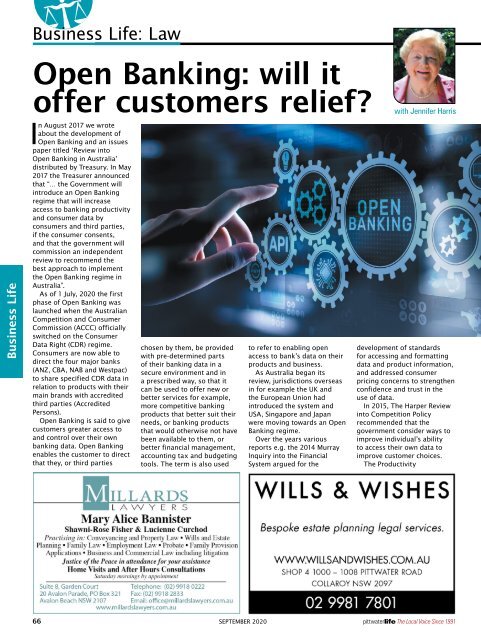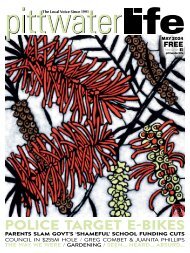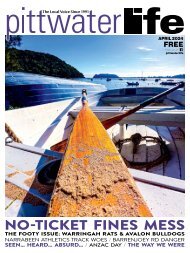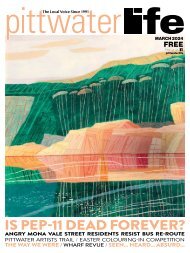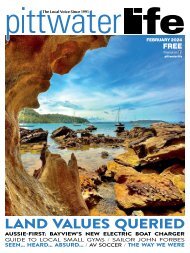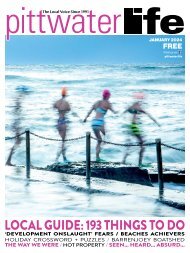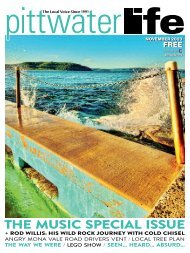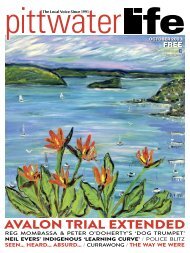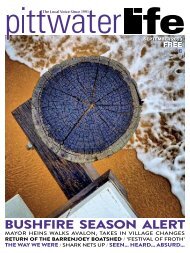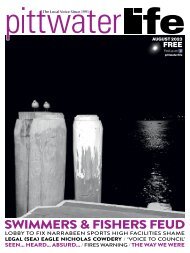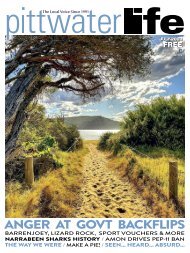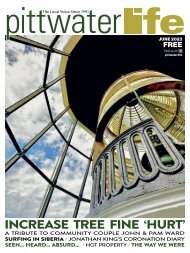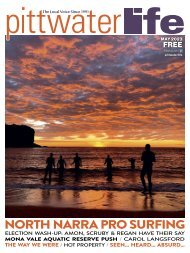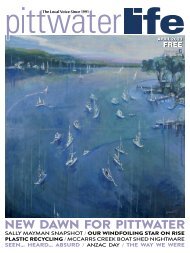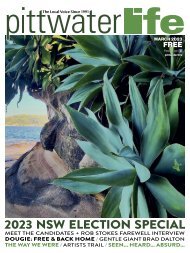Pittwater Life September 2020 Issue
OUR BEACHES ART PRIZE WINNERS. MUSO PAUL CHRISTIE: FROM ‘PARTY BOY’ TO ROCK ’N’ ROLL STORYTELLER. COVID CASUALTY: IS THE ENVIRONMENT. COPING WITH INCREASED WASTE? LOCAL PRINCIPAL SIGNS OFF / COUNCIL NEWS /SEEN... HEARD... ABSURD...
OUR BEACHES ART PRIZE WINNERS. MUSO PAUL CHRISTIE: FROM ‘PARTY BOY’ TO ROCK ’N’ ROLL STORYTELLER. COVID CASUALTY: IS THE ENVIRONMENT. COPING WITH INCREASED WASTE? LOCAL PRINCIPAL SIGNS OFF / COUNCIL NEWS /SEEN... HEARD... ABSURD...
- No tags were found...
Create successful ePaper yourself
Turn your PDF publications into a flip-book with our unique Google optimized e-Paper software.
Business <strong>Life</strong>: Law<br />
Business <strong>Life</strong><br />
Open Banking: will it<br />
offer customers relief?<br />
In August 2017 we wrote<br />
about the development of<br />
Open Banking and an issues<br />
paper titled ‘Review into<br />
Open Banking in Australia’<br />
distributed by Treasury. In May<br />
2017 the Treasurer announced<br />
that “… the Government will<br />
introduce an Open Banking<br />
regime that will increase<br />
access to banking productivity<br />
and consumer data by<br />
consumers and third parties,<br />
if the consumer consents,<br />
and that the government will<br />
commission an independent<br />
review to recommend the<br />
best approach to implement<br />
the Open Banking regime in<br />
Australia”.<br />
As of 1 July, <strong>2020</strong> the first<br />
phase of Open Banking was<br />
launched when the Australian<br />
Competition and Consumer<br />
Commission (ACCC) officially<br />
switched on the Consumer<br />
Data Right (CDR) regime.<br />
Consumers are now able to<br />
direct the four major banks<br />
(ANZ, CBA, NAB and Westpac)<br />
to share specified CDR data in<br />
relation to products with their<br />
main brands with accredited<br />
third parties (Accredited<br />
Persons).<br />
Open Banking is said to give<br />
customers greater access to<br />
and control over their own<br />
banking data. Open Banking<br />
enables the customer to direct<br />
that they, or third parties<br />
chosen by them, be provided<br />
with pre-determined parts<br />
of their banking data in a<br />
secure environment and in<br />
a prescribed way, so that it<br />
can be used to offer new or<br />
better services for example,<br />
more competitive banking<br />
products that better suit their<br />
needs, or banking products<br />
that would otherwise not have<br />
been available to them, or<br />
better financial management,<br />
accounting tax and budgeting<br />
tools. The term is also used<br />
to refer to enabling open<br />
access to bank’s data on their<br />
products and business.<br />
As Australia began its<br />
review, jurisdictions overseas<br />
in for example the UK and<br />
the European Union had<br />
introduced the system and<br />
USA, Singapore and Japan<br />
were moving towards an Open<br />
Banking regime.<br />
Over the years various<br />
reports e.g. the 2014 Murray<br />
Inquiry into the Financial<br />
System argued for the<br />
with Jennifer Harris<br />
development of standards<br />
for accessing and formatting<br />
data and product information,<br />
and addressed consumer<br />
pricing concerns to strengthen<br />
confidence and trust in the<br />
use of data.<br />
In 2015, The Harper Review<br />
into Competition Policy<br />
recommended that the<br />
government consider ways to<br />
improve individual’s ability<br />
to access their own data to<br />
improve customer choices.<br />
The Productivity<br />
66 SEPTEMBER <strong>2020</strong><br />
The Local Voice Since 1991


